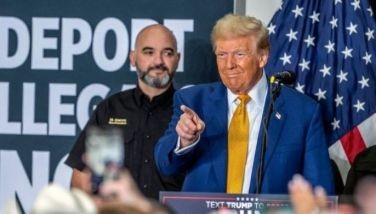S. Korea president, China premier meet ahead of 3-way summit
SEOUL - South Korean President Park Geun-hye and Chinese Premier Li Keqiang discussed trade issues yesterday, meeting one-on-one a day before their three-way summit with Japanese Prime Minister Shinzo Abe that aims to repair relations strained by historical and territorial matters.
At the meeting between Park and Li at the presidential Blue House in Seoul, the countries reached an agreement to work toward ratifying by the end of the year a bilateral free trade agreement that has yet to gain approval from South Korean lawmakers, Park's office said. The sides, two of the region's closest economic partners, also agreed to work toward expanding South Korean food exports to China and strengthening industrial cooperation in areas such as robotics.
There was speculation that Li might also seek assurance from Park that South Korea, a key US ally, will keep a neutral stance over the recent flare-up between Washington and Beijing over the US Navy's freedom of navigation operations in the disputed waters of the South China Sea. An official from the Blue House couldn't immediately confirm whether the issue came up during yesterday's meeting.
About 28,500 US troops are stationed in South Korea as deterrence against potential aggression from rival North Korea.
Sunday's trilateral summit will be the first since 2012. The meetings were shelved after Japan's ties with its two neighbors deteriorated over disputes stemming from its World War II-era aggression and territorial claims.
Park will meet separately with Abe on Monday in the first formal summit between South Korea and Japan in more than three years.
Japan and China have been gradually resuming exchanges following 2012 tensions over the control of disputed islands in the East China Sea. The rift began healing after diplomats agreed to restart contacts last November, when Chinese President Xi Jinping briefly met and shook hands with Abe.
Park has met with Xi six times since she took office in 2013, in efforts to further strengthen ties with Beijing. China is South Korea's largest trade partner, and also has leverage with North Korea, Seoul's hard-to-read, nuclear-armed rival.
However, Seoul's ties with Tokyo have been persistently icy after the hawkish Abe came to power in December 2012, with the countries struggling to settle disputes stemming from Japan's brutal colonial rule of the Korean Peninsula in the early 20th century. China has similar gripes with Japan.
The US wants Japan and South Korea, important allies in the region, to be on better terms to counter China's growing geopolitical influence, including in the South China Sea, and also to strengthen security cooperation against North Korea.
Earlier in the week, the US Navy sailed a warship close to one of China's artificial islands in the South China Sea. It was most direct challenge yet by the US to artificial island building by Beijing that has upset other claimants in the South China Sea, including the Philippines, a close US ally.
China claims nearly all of the South China Sea, but Washington says the waters are international territory and must be open for navigation.
At this weekend's meetings, China might try to work its growing influence with South Korea so that Seoul maintains a muted, neutral stance in the South China Sea dispute instead of supporting the US, said Kim Sung-han, a professor at Seoul's Korea University and a former South Korean deputy foreign minister. Japan is unlikely to get too involved in the South China Sea dispute since it's not a direct party to the conflict, he said.
"Li might try to sneak a comment past Park, like how China would sensibly and carefully handle the South China Sea issue as a matter of its sovereignty," Kim said. "The Chinese are skillful at finding ways to get their message across without disrupting the main agendas (of the meetings)."
While it's unlikely that anything exceptional will result from the Seoul meetings, it's meaningful that the Northeast Asian neighbors have taken the first step toward overcoming their bitter differences by restoring an environment for higher-level dialogue, said Bong Youngshik, a senior analyst at Seoul's Asan Institute for Policy Studies.
Although much attention has been focused on history and territory, analysts believe the talks are more likely to be driven by economic and security issues. China, in particular, seems to be approaching the meetings in Seoul with a clear emphasis on economic relations as it desperately looks for ways to jolt its faltering economy.
Chinese Premier Li, a policymaker with a focus on economic issues, is expected to push talks for a three-way free trade agreement including Japan that would give China's economy a needed boost. The three countries had discussed the possibility of trilateral free trade in their last summit in Beijing in May 2012.
It remains to be seen whether the three leaders will be able to express something more than generalized acknowledgement and concern over North Korea's nuclear ambitions.
Chinese envoy Liu Yunshan's appearance at a military parade in Pyongyang earlier this month was considered a sign that China was moving to restore normalcy in its relations with North Korea, which had been seen as strained to some extent because of the latter's provocations in recent years. Park will also be reluctant to make a strong statement against North Korea in the presence of Abe because of public concern in South Korea over Japan's recent moves toward allowing an expanding role for its military, Bong said.
- Latest
- Trending




























